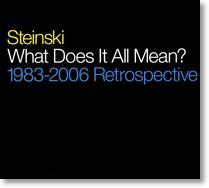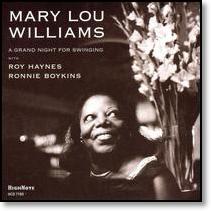A Consumer Guide to the Trailing Edge: July, 2008
Recycled Goods (#55)
by Tom Hull
 |
 |
Record count grew from 12 to 14 to 17 the last three months since I brought Recycled Goods back off the shelf and into some limited form of revival. Count drops to 11 this month, and most of that is overflow from Jazz Prospecting. It's been that kind of month. Could complain about the well drying up, but actually I'm behind on world music.
Steinski: What Does It All Mean? 1983-2006 Retrospective (1983-2006 [2008], Illegal Art, 2CD): Doug DiFranco (Double Dee) and Steve Stein (Steinski) cut up a legendary homage to "The Message" back in 1983, then had it almost instantly chased from print for not clearing the numerous copyright bits they mixed in. As far as I know, Steinski hasn't gotten more legal since: a CD briefly appeared in 2002 called Nothing to Fear: A Rough Mix, and another in 2003, Steinski's Burning Out of Control: The Sugarhill Mix. This new compilation recycles most, or possibly all, of the above. The squashed beats shuffle endlessly, many from sources you'll recognize at once and never grow tired of, but the spoken word humor lifts this above any competition, even when it isn't as obvious as the Marx Brothers. A
Mary Lou Williams: A Grand Night for Swinging (1976 [2008], High Note): Got her start playing church organ on her mama's lap. Turned pro at age 6, and hit the road at 12. Cut her first records at 17 in 1927, really making her mark in the 1930s as pianist-arranger for Andy Kirk's Kansas City big band, going on to write extended works like The Zodiac Suite. Picked up bebop almost as naturally as she took to swing, and after a long hiatus reappeared in the 1970s as the hippest old lady in the business. This is just a live set caught in Buffalo, her trio mostly playing covers, a nice showoff spot for drummer Roy Haynes, the title cut reprised. It's all dazzlingly alive, spirit-lifting -- maybe all that praying paid off. Ends with a bit of interview, you won't mind hearing more than once. A-
Briefly Noted
George Cables: Morning Song (1980 [2008], High Note): Two sides of Art Pepper's favorite pianist of the period: six tightly wound solo cuts, mixed with four loosely sprung quartet takes, with Eddie Henderson's airy, boppish trumpet out in the lead. B+
Can't You Hear Me Callin': Bluegrass: 80 Years of American Music (1925-2002 [2004], Columbia/Legacy, 4CD): First disc ends with bluegrass founder Bill Monroe, a set of old-time country classics; next two discs run heavy with Monroe, Lester Flatt & Earl Scruggs, Stanley Brothers, Jimmy Martin, Jim & Jesse, Osborne Brothers -- a label comp in absolute control of its subject; only the last disc wanders with the Byrds and the Dixie Chicks among the odd choices. A-
Lou Donaldson: Here 'Tis (1961 [2008], Blue Note): A turning point as the alto saxophonist moves from Bird bebopper to soul jazzer, helped along by organ funkmeister Baby Face Willette and even more so by Grant Green's tasty guitar licks; not quite recognizing the challenge, Donaldson goes with the groove. B+
John Patton: Soul Connection (1983 [2008], Just a Memory): Soul jazz organist, had a strong run with Blue Note in the 1960s, trouble finding work thereafter, picked up this session in Switzerland -- his only record between 1969 and 1993 -- with guitarist Melvin Sparks consistently in the groove, and trombonist Grachan Moncur III interesting even when off on his own; boogaloo with brains. B+
Alvin Queen: Jammin' Uptown (1985 [2008], Just a Memory): A front line including Terence Blanchard blows hot and heavy, but all the interesting spots here come from the back benchers in the rare moments when they can break in -- pianist John Hicks, trombonist Robin Eubanks, and the leader, a drummer more subtle than his hard bop rep suggests. B
Wally Rose: Whippin' the Keys (1968-71 [2008], Delmark): A pianist in San Francisco dixieland bands led by Lu Watters, Bob Scobey, and Turk Murphy, Rose cut a couple of solo records of ragtime classics in the 1950s, and dug further into the genre in two later albums reissued here -- 16 of 21 songs have "rag" in the title somewhere, with "Pickles & Peppers" a typical exception. B+
Willie "The Lion" Smith & Don Ewell: Stride Piano Duets: Live in Toronto, 1966 (1966 [2008], Delmark): The old stride piano master, reinforced by one of his finest students; The Lion can't sing, but he only tries twice, and he's such a charming rogue you don't mind, especially when the keys tinkle so sprightly. B+
Cy Touff & Sandy Mosse: Tickle Toe (1981 [2008], Delmark): Two obscure Chicago jazzmen -- Touff plays bass trumpet and has connections that landed him a West Coast rep based mostly on an album for Pacific Jazz; Mosse plays tenor sax and is happy just to remind people of his idol Lester Young, author of the title song; both dead now, this easy-going swing/bop session, something for the curious to remember them by. B+
Stanley Turrentine: Return of the Prodigal Son (1967 [2008], Blue Note): A Duke Pearson-produced tentet session brought back to its original shape after 7 of 10 tracks were cast off on various releases; in theory a big band for a big man, in practice he gets a little overwhelmed until the alternate take of "Dr. Feelgood," but the band never loses interest. B+
Additional Consumer News
Notes
Copyright © 2008 Tom Hull.